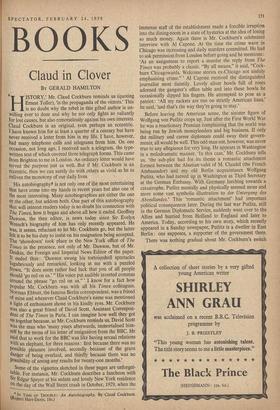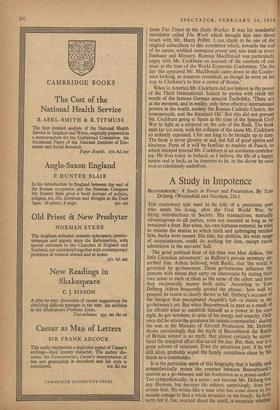BOOKS
Claud in Clover
BY GERALD HAMILTON 6 ISTORY,' Mr. Claud Cockburn reminds us (quoting Ernest Toiler), 'is the.propaganda of the victors.' This is no doubt why the rebel in this gifted author is un- willing ever to doze and why he not only fights so valiantly for lost causes, but also remorselessly against his own interests. Claud Cockburn is an original, even perhaps an eccentric. I have known him for at least a quarter of a century but have never received a letter from him in my life. I have, however, had many telephone calls and telegrams from him. On one occasion, not long ago, 1 received such a telegram, the type- written text of which covered three telegraph forms. This came from Brighton to me in London. An ordinary letter would have served the purpose just as well. But if Mr. Cockburn is an eccentric, then we can surely do with others as vivid as he to enliven the monotony of our daily lives.
His autobiography t is not only one of the most entertaining that have come into my hands in recent years but also one of the most interesting. Many autobiographies are either the one or the other, but seldom both. One part of this autobiography that will interest readers today is no doubt his connection with The Times, how it began and above all how it ended. Geoffrey Dawson, the then editor, is news today since Sir. Evelyn Wrench's biography of him has only recently appeared. He Was, it seems, reluctant to let Mr. Cockburn go, but the latter felt it to be his duty to insist on his resignation being accepted. The 'showdown' took place in the New York office of The Times in the presence, not only of Mr. Dawson, but of Mr. Deakin, the Foreign and Imperial News Editor of the paper. It ended thus : 'Dawson swung his tortoiseshell spectacles lugubriously and remarked, looking at me with a puzzled frown, "It does seem rather bad luck that you of all people should `go red on us.' " His voice put audible inverted commas around the phrase "go red on us." ' I know for a fact how Popular Mr. Cockburn was with all his Times colleagues. Norman Ebbutt, the famous Berlin correspondent, was a friend of mine and whenever Claud Cockburn's name was mentioned a light of enthusiasm shone in his kindly eyes. Mr. Cockburn was also a great friend of David Scott, Assistant Correspon- dent of The Times in Paris. I can imagine how well they got on together because, as Mr. Cockburn reminds us, David Scott was the man who 'many years afterwards, immortalised him- self by the terms of his letter of resignation from the BBC. He said that to work for the BBC was like having sexual relations with an elephant, for three reasons : first because there was no Possible pleasure involved, secondly because of the grave danger of being overlaid, and thirdly because there was no Possibility of seeing any results for twenty-one months.'
Some of the vignettes sketched in these pages are unforget- table. For instance, Mr. Cockburn describes a luncheon with Sir Edgar Speyer at his sedate and lovely New York residence on the day of the Wall Street crash in October. 1929, when the IN TIME OF TROUBLE: An Autobiography. By Claud Cockburn. (Rupert Hart-Davis, 18s.) immense staff of the establishment made a forcible irruption into the dining-room in a state of hysterics at the idea of losing so much money. Again there is Mr. Cockburn's celebrated interview with Al Capone. At the time the crime wave in Chicago was increasing and daily murders committed. He had to ask permission from London before going and he mentions : `As an assignment to report a murder the reply from The Times was probably a classic. "By all means," it said, "Cock- burn Chicagowards. Welcome stories ex-Chicago not unduly emphasising crime."' Al Capone received the distinguished journalist most daintily. Lovely silver bowls full of roses adorned the gangster's office table and into these bowls he occasionally dipped his fingers. He attempted to pose as a patriot : 'All my rackets are run on strictly American lines,' he said, 'and that's the way they're going to stay.'
Before leaving the American scene, the sinister figure of Wolfgang von Putlitz crops up. Just after the First World War he was a reactionary Prussian complaining that the world was being run by Jewish moneylenders and big business. if only the military and career diplomats could sway their govern- ments; all would be well. This odd man out, however, was never true to any allegiance for very long. He appears in Washington in a melodramatic manner. 'In this case,' Mr. Cockburn tells us, 'the sub-plot had for its theme a romantic attachment formed between the Alsatian valet of M. Claude! (the French Ambassador) and my old Berlin acquaintance Wolfgang Putlitz, who had turned up in Washington as Third Secretary at the German Embassy. With Germany lurching towards a catastrophe, Putlitz mentally and physically seemed more and more some vast symbolic illustration to der Untergang des Ahendlandes.' This 'romantic attachment' had important political consequences later. During the last war Putlitz, still in the German Diplomatic Service, suddenly went over to the Allies and hurried from Holland to England and later to America. Today, according to his own story, which recently appeared in a Sunday newspaper, Putlitz is a dweller in East Berlin : one supposes, a supporter of the government there.
There was nothing gradual about Mr. Cockburn's switch from The Times to the Daily Worker. It was his wonderful newsletter called The Week which brought him into direct touch with Mr. Harry Pollitt. I can claim to be one of the original subscribers to this newsletter which, towards the end of its career, wielded enormous power and was read in every Embassy and Ministry. Ramsay MacDonald was particularly angry with Mr. Cockburn on account of the contents of one issue at the time of the World Economic Conference. 'On the day this appeared Mr. MacDonald came down to the Confer- ence looking, as someone remarked, as though he were on his way to Clarkson's to hire a crown of thorns.'
When in America Mr. Cockburn did not believe in the power of the Third International. Indeed he quotes with relish the words of the famous German essayist Tucholsky, 'There are at the moment, and in reality, only three effective international powers in the world, namely the Roman Catholic Church, the homosexuals, and the Standard Oil.' But this did not prevent Mr. Cockburn going to Spain at the time of the Spanish Civil War to fight as a corporal on the side of the Reds. The book ends far too soon, with the collapse of the cause Mr. Cockburn so ardently espoused. I for one long to be brought up to date. The book is never gloomy or sad, but full of good spirits and kindness. Parts of it will be familiar to readers of Puneh,.to which intrepid journal Mr. Cockburn is an assiduous contribu- tor. He lives today in Ireland, so I believe. the life of a happy squire and is back, as he deserves to be, in the clover he once trod so relentlessly underfoot.



































 Previous page
Previous page